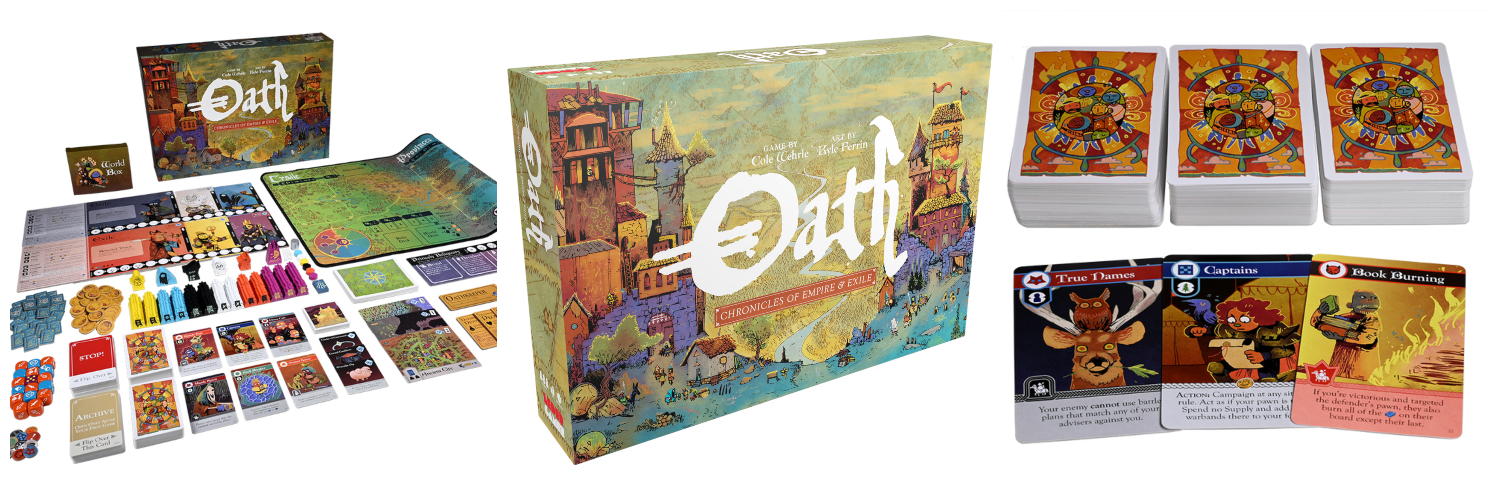Oath: Chronicles of Empire and Exile by Leder Games
Price: ~$120.00
Players: 1 to 6
Playtime: 45 to 120 minutes
Perfect for: Gaming groups who enjoy complex negotiated-strategy games filled with multiple paths to victory.
Oath: Chronicles of Empire and Exile is a game of power and rule! How that power gets acquired or used is up to the actors: the Chancellor who lords over all; the Citizens who must choose to follow or rebel; and the Exiles—former citizens who faced the wrath of the Chancellor. Each role has benefits and hindrances, and often these positions switch among players throughout the course of the game. But, with enough cunning, anyone can emerge the victor.
To begin Oath: Chronicles of Empire and Exile, one to six players choose a role and acquires their corresponding player board and resources (note that for fewer than three players, automated players are required). A world map gets constructed, primarily consisting of lands filled with various cards that grant abilities, resources, and powers. Finally, and quite importantly, an Oathkeeper goal gets selected which dictates the rule conditions that certain roles must achieve to win the game.
Gameplay in Oath: Chronicles of Empire and Exile is incredibly extensive, so this overview will only cover some basics. Essentially, players have a bank of action points to spend each turn, allowing them to traverse the board to gain various resources. In addition, players will be able to build up armies and battle others to gain control of the land—and control gives the owner more abilities. However, collecting certain items, such as relics, can also lead to victory albeit often in more a stealthy way. And finally, players can form alliances to further their own agendas or potentially block another’s path to glory.
RELATED: Tabletop Game Review – Root: The Underworld Expansion
What works in Oath: Chronicles of Empire and Exile is the incredibly immersive experience that hangs in a wonderfully delicate balance. One could argue that for the Chancellor, the simulation (or illusion) of power is accurate: they must keep a watchful eye on so many different developments to ensure that they maintain control. And those developments manifest in a multitude of ways. Players may be overt or subtle in their intentions and can even employ heavy misdirect. For example, some cards reveal “visions” can secretly grant a player an entirely new win condition unbeknownst to others. Others may play a longer game, assembling a particular type of resource to unload for a power play later. Point being, Oath: Chronicles of Empire and Exile has incredible depth within its world allowing for multiple gameplay styles and tactics.
Players who don’t enjoy incredibly complex strategy games that often include treachery may not enjoy Oath: Chronicles of Empire and Exile as much as others. The collection of rules, caveats, and exceptions is massive. This may feel both daunting and overwhelming to players unfamiliar with the multiple mechanics Oath employs (area-control, resource management, probability-based combat, etc.). To its credit, Oath does become a well-oiled machine after a few rounds, but the learning curve for the iconography and conditional activities can be steep.
Oath: Chronicles of Empire and Exile is an excellent game, but it requires a) an investment, both monetarily and of time/patience, and b) a group whose collective gaming experience and acumen is at an incredibly high-level. In an industry of titles that thrive on (if not encourage) emulation, it’s refreshing to see Leder Games once again develop something that feels wholly novel and impressive. It’s okay that Oath isn’t for everyone—that’s not its intention—so it is important to laud the game for achieving its likely intended goal: an epic experience unlike anything else out there. Highly recommended.
Recommended if you like: Root, Blood Rage, Vast
Final Grade: A
 FOR FANBOYS, BY FANBOYS
Have you checked out LRM Online’s official podcasts and videos on The Genreverse Podcast Network? Available on YouTube and all your favorite podcast apps, This multimedia empire includes The Daily CoG, Breaking Geek Radio: The Podcast, GeekScholars Movie News, Anime-Versal Review Podcast, and our Star Wars dedicated podcast The Cantina. Check it out by listening on all your favorite podcast apps, or watching on YouTube!
Subscribe on: Apple Podcasts | Spotify | SoundCloud | Stitcher | Google Play
FOR FANBOYS, BY FANBOYS
Have you checked out LRM Online’s official podcasts and videos on The Genreverse Podcast Network? Available on YouTube and all your favorite podcast apps, This multimedia empire includes The Daily CoG, Breaking Geek Radio: The Podcast, GeekScholars Movie News, Anime-Versal Review Podcast, and our Star Wars dedicated podcast The Cantina. Check it out by listening on all your favorite podcast apps, or watching on YouTube!
Subscribe on: Apple Podcasts | Spotify | SoundCloud | Stitcher | Google Play




